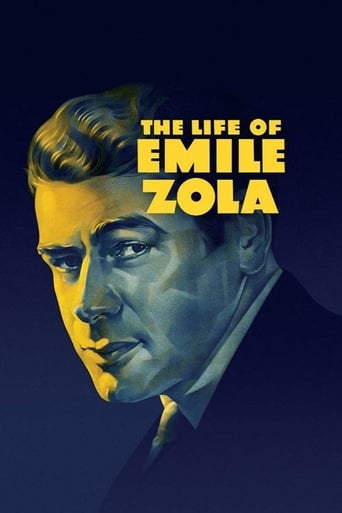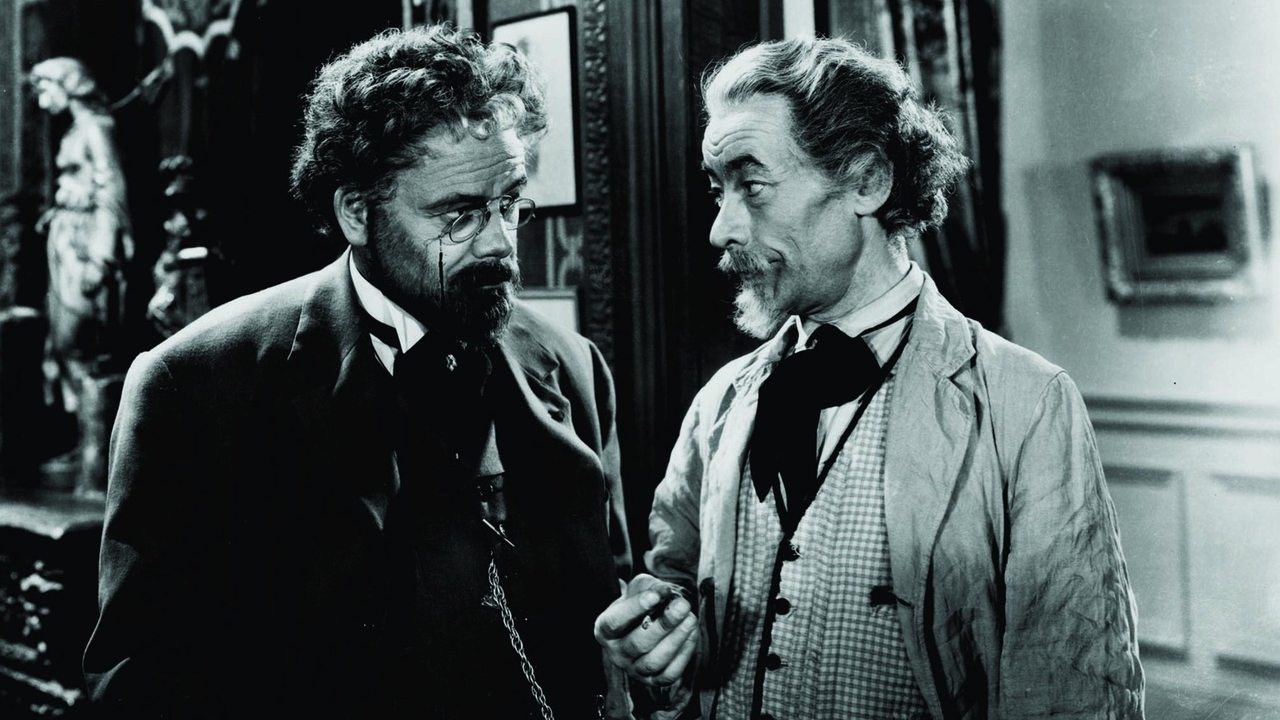gavin6942
The biopic of the famous French muckraking writer (Paul Muni) and his involvement in fighting the injustice of the Dreyfus Affair.Certain scenes have been interpreted in the context of the time as a reaction to the increasing repression of Nazi Germany. Critic David Denby in 2013 noted that, while the movie featured progressive rhetoric in Zola's last speech, overall it was "a perfect example of the half-boldness, half-cowardice, and outright confusion that marked Hollywood's response to Nazism and antisemitism in the nineteen-thirties." For instance, the film never mentioned "antisemitism" or "Jew".I find it very interesting that you can have a film about these topics without ever saying the words. Possible? Obviously. But it seems like you would almost have to go out of your way.One could question the relevance of this film today (2016). Not that the message is not important or anything like that, but who knows what the Dreyfus Affair was? A major historical event, yes, especially in France, but I doubt sincerely that 1 out of 100 Americans knows what it was about.
LeonLouisRicci
This Movie remains elusive in two regards. Paul Muni, one of the most exalted and honorable Actors of the Thirties (hardly a name mentioned or even recognized among Cinema goers Today) and Emile Zola a Crusader for Human Rights and "The Truth" who was very popular and influential in late Nineteenth Century France (is virtually unknown, unread and forgotten).But not in 1937, just a few decades after His Death, His Legacy was much more in the Public Conscientious. So, Muni was given the Role (Won the Oscar the Year before as Louis Pasteur) and Zola was given the Royal Hollywood Studio treatment and managed to garner many Oscar Nominations and did Win for Best Picture of the Year.It is a straightforward, Low-Key presentation that is glossy and finely Produced with all the Studio Craftsman contributing to accessibility and appeal as Social Commentary Entertainment. Viewers Today may opine with such things as overrated, unremarkable, slow, stodgy, hammy, and lacking in what has become an ever increasing, over the Years, reliance of less nuance and more crackling and crisp Cinema.But the Message is the Medium here and without doubt it is delivered with intelligence. That is the remaining residue of this Film. A no frills introspection of one Freedom Fighter that used a Pen as His Weapon. It is just as Mighty coming from the Heart and in the hands of Zola and this Hollywood Ography.
Robert J. Maxwell
You really have to like these Warner Brothers biographical movies from the 1930s. They're in black and white, true, and they may gloss events and invent speeches a little differently from the way you and I might, but they're -- well -- they're EDUCATIONAL. You can learn basic historical facts from them. This isn't an achievement to be taken lightly, not in a country in which 28% of voters believe Saddam Hussein was behind the 9/11 attacks, or in which a substantial number of students think Watergate took place before 1900.I don't mean that the Warners' biopics were academic studies. Far from it. As here, we generally see a hero (or heroine) perform some socially disapproved of act and then being redeemed. He usually dies at the end, either with a peaceful smile on his face, his work on earth now being complete, or with a pen or a pistol in his hand, full of fight. Zola gets the pen treatment.Emile Zola, author of any number of infrequently read French novels ("Nana" may be his best known), was a famous figure at the time of this story, the end of the 19th century, when he decided to take up the cause of Alfred Dreyfus, an innocent army officer who had been convicted of treason, partly because he was Jewish.Zola and his big mouth intervene after Dreyfus is sent to "a living death" on Devil's Island. Zola writes an inflammatory newspaper article -- "J'Accuse," which the movie helpfully translates as "I Accuse" -- and provokes a suit for libel. The French Army is mostly a proud and cohesive group and although the evidence against Dreyfus was rigged, nobody wants to admit it. Do Zola's strenuous efforts pay off at the end? If they didn't, Warners wouldn't have made this movie.The formula usually remained the same, with some variations. (Sometimes the resolute hero alienates a former friend, and so forth.) Paul Muni starred in more than one of them. He overacts, but that's part of getting the MESSAGE across. When he gives a rousing speech at the trial, he huffs and puffs, he waves his hands, his chin snaps up and down like a traveling block on an oil rig, and when he's not shouting, he's hissing his lines."The truth is on the march -- and nothing will stop it!", he says confidently. I don't think Emile Zola ever said any such thing. I have doubts that anyone, at any time in the course of human history, has ever said such a thing, although they might have written it in a pamphlet or as a line of dialog in an entertaining and educational movie.Some may notice some irony in the fact that the Army convicted Dreyfus partly because of anti-Semitism but never wanted to admit it, while the movie hardly even mentions it because the studios didn't want to bring up the edgy subject.
kenjha
The first third of this biography, devoted to Zola's rise from poverty to fame, is rather dull. It picks up steam with the introduction of the Dreyfus affair, wherein a Jewish Army captain is falsely accused of treason, although the anti-semitism angle is ignored by the film. Muni is terribly hammy in the title role, playing Zola as a pompous blow-hard. As he showed in "The Good Earth" the same year, the actor was never able to adapt his theatrical acting to the screen. Schildkraut is OK as Dreyfus, a performance that won him an Oscar, but Sondergaard overacts as his wife. This overcooked drama beat out the likes of "Stage Door" and "The Awful Truth" to win the Best Picture Oscar.


 AD
AD



